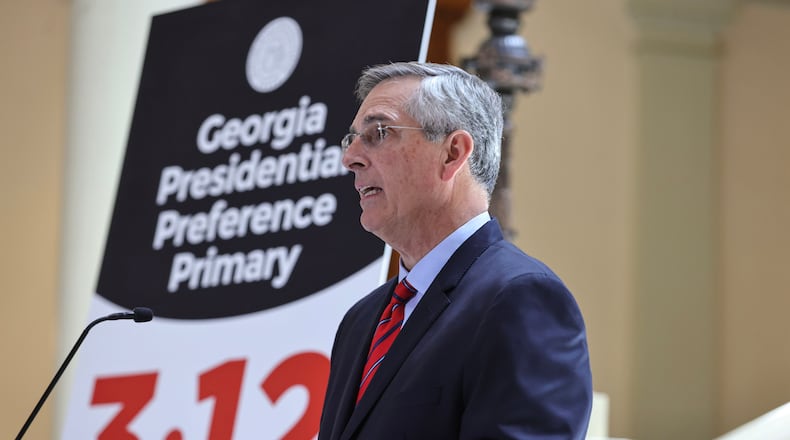A Georgia court’s rejection of the State Election Board’s recent rule changes regarding hand counting of ballots and certification is a clear win for all voters, demonstrating just how untenable the board’s recent decisions have been. Hopefully, the court’s rebuke will put an end to the board’s attempts to make disruptive last-minute changes. However, there isn’t anything much more disruptive to election preparations than frivolous mass challenges to voter eligibility.
Although many states have provisions allowing for challenges to other voters’ eligibility, Georgia stands out in its permissiveness in at least two ways: First, Georgia explicitly bans any caps on the number of challenges an individual may submit. Second, Georgia allows voters to be challenged until the day before absentee ballot scanning begins or a voter casts a ballot in person on Election Day. In other words, there is nothing in state law that would prevent the submission of a large number of frivolous eligibility challenges even up to the very eve of Election Day, which, despite being postponed until certification is complete, could create confusion, cast doubt on the integrity of the election process and serve as the basis for frivolous post-certification litigation.
Credit: contributed
Credit: contributed
Credit: contributed
Credit: contributed
At VoteShield, a nonpartisan nonprofit, we actively track changes to many states’ voter registration rolls by regularly examining publicly available voter files. Since the beginning of the year, we have been collecting lists of challenged voters across six states, including Georgia. We recently published the results of our analysis of these lists, where we find they are largely frivolous, redundant to the efforts administrators already make and they rightfully fail to achieve their goals of seeing voters removed from the rolls.
Even though false claims of noncitizen voting have taken a central role in election dis- and misinformation, not one of the more than 6,000 Georgia challenges we received listed citizenship status as the grounds for the challenge. This is completely in line with Secretary of State Raffensperger’s recent announcement that they could only find 20 non-citizens out of more than 8.2 million on the rolls (that’s 0.00000024%). Instead of citizenship, we find that approximately 95% of the Georgia challenges were for residency status, while the remainder were for suspected deaths.
Of the challenges we reviewed that had a definitive challenge date, 74% were already listed as inactive at the time of their challenges, meaning election administrators had already done their job of flagging them for eventual removal pursuant to federal law.
As we wrote a year ago, states and counties continually engage in maintenance of the voter rolls and are significantly better equipped to do so than the average citizen, so it’s no wonder that these challenges mostly just repeat the excellent work election officials have already done.
Even more concerning, about 4% of the challenged voters had already been removed, demonstrating not only that the challengers’ work was redundant but, more important, that they relied on months-old stale voter data. Relying on old data to identify challenges based on residency is particularly problematic because old data won’t contain recent updates, and many voters only update their addresses in the period before an election.
This means voters who have moved and appropriately responded to notices from local election officials requesting updated voter registration information might be challenged because activists are relying on obsolete data. This can often be incredibly frustrating and confusing for the voter, and places an unnecessary burden on diligent election administrators.
Even though these challenges largely fail to secure the removal of voter records, they have significant consequences for Georgians. Administering a free and fair election for a population as large and complex as Georgia’s requires the expertise of committed, skilled individuals. Saddling local election administrators with the burdens of mass challenges at this critical point in the election cycle could deprive Georgia voters of that much-needed expertise and lead to serious issues on and after Nov. 5.
These mass challenges are frivolous, redundant and ineffective. They are a recipe for deception and disruption. The National Voter Registration Act lays out clear guidelines for list maintenance to help states navigate the precarious balance between election integrity and election access, and these challenges cannot be used to circumvent the requirements of the NVRA, the protections in the Voting Rights Act or the rights guaranteed in the United States and Georgia Constitutions. Therefore, we encourage the secretary of state to issue guidance further clarifying the requirements of OCGA 21-2-230 and reminding local administrators that changes in law from earlier this year require them to set aside any last-minute challenges until after the election has been certified.
Unfortunately, deception and disruption might be the goal of the election-denial organizations that promote mass challenges based on a false election fraud narrative. In fact, we can view the rise of mass challenges as one part of a broader strategy that also includes disinformation about mass noncitizen voting, pressure campaigns to not certify legitimate outcomes and frivolous litigation against election administrators. Taken as a whole, these efforts send the clear but completely inaccurate message that our elections are not to be trusted and provide election conspiracy organizations with straw men they can reference if their preferred candidate doesn’t win.
The people of Georgia deserve better. It is time for these ridiculous attempts to subvert Georgia’s election administrators’ efforts to end and conspiracy theorists to leave this precious and critical work to the professionals for the good of every voter in the state of Georgia and the United States of America.
Peter Simmons is the Georgia policy strategist at Protect Democracy. Clint Swift is a data scientist at VoteShield.
Keep Reading
The Latest
Featured


